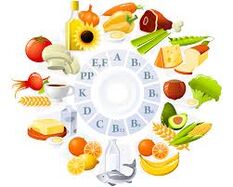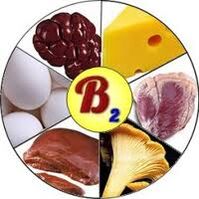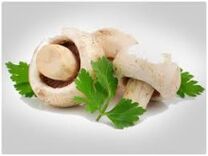
Everyone knows that our body needs vitamins, but few people understand that these substances are necessary for the brain to function properly. In addition, certain groups of vitamins are required to maintain memory and thinking, which will be discussed below.
The most important B vitamins for memory
B vitamins are the most important for the nervous system. We can say that members of this group have the greatest impact on human memory and thinking. They support the function of nerve cells, prevent premature aging, and protect the brain from overload and stress. Deficiency or complete absence of B vitamins can lead to severe damage to the nervous system, reduced memory and intelligence.
This group of vitamins includes vitamins B1, B2, B3, B5, B6, B9, and B12, which are the most important for the brain.
thiamine - vitamin B1
Thiamine - Vitamin B1, also known as "mind vitamin", is the one that has the greatest effect on a person's mental ability and memory. Lack of it leads to confusion and memory loss. Vitamin B1 directly protects the nervous system and is involved in supplying the brain with glucose.
A person is deficient in this vitamin during a good diet, because it is found in many foods: oats and buckwheat (abundant in grains and husks), bran, beans, nuts, carrots, radishes, beans, potatoes, spinach - a supplier of thiamine.

It is well absorbed, but quickly degraded, especially under the influence of alcohol, nicotine, sugar, tea extractors.
Vitamin B1 deficiency causes symptoms:
- memory impairment;
- muscle weakness;
- high physical and mental fatigue;
- coordination and pressing are impaired;
- numbness of your limbs;
- unreasonable irritation;
- depressed mood;
- crying and anxiety;
- Sleep Disorders.
In severe cases, polyneuritis, paralysis and paresis of the legs may develop. Cardiovascular system worsens, changes in the gastrointestinal tract may occur (stool, constipation, dizziness).
Riboflavin - Vitamin B2
Vitamin B2 - Riboflavin is an "energy vitamin", involved in the synthesis of nerve cells and the activity of neurotransmitters (biologically active substances that transmit nerve impulses), which accelerate energy and metabolism in the body, including mental processes in the brain. in nerve cells). In its absence, exercise leads to fatigue, not strength and activity. Vitamin B2 tolerates high temperatures well, but decomposes rapidly in light.Riboflavin is found in meat and dairy products. These are the liver, kidneys, eggs, dairy products, yeast, tomatoes, cabbage, dog rose.

Vitamin B2 deficiency:
occurs- headache;
- Decreased speed of mental processes;
- drowsiness;
- loss of appetite;
- weight loss;
- weakness.
In addition, there are skin changes - sores and cracks in the corners of the mouth (cheilitis), dermatitis of the chest and face; visual disorders - photophobia, lacrimation due to inflammation of the cornea and conjunctiva; The synthesis of adrenal hormones is disrupted.
Nicotinic acid is vitamin B3 or PP
Nicotinic acid (nicotinamide, niacin) - vitamin B3 - can be called a "quiet vitamin". Vitamins are involved in the synthesis of enzymes and help to extract energy from food, the lack of which causes the body to feel fatigue, depression, depression, insomnia. In addition, nicotinamide is directly involved in the biosynthesis of hormones (estrogens, progesterone, cortisol, testosterone, insulin, etc. ).
Most vitamin B3 is found in animal foods: in the liver, eggs, kidneys, and lean meat; Fruits and vegetables - asparagus, parsley, carrots, garlic, green peas, peppers.
If not present in food, pellagra will form. The main symptoms of this condition are diarrhea (diarrhea), dermatitis (inflammation of the exposed surfaces of the skin) and dementia (acquired dementia).
Pantothenic Acid - Vitamin B5

Vitamin B5 - Pantothenic Acid - This vitamin is found in many foods. This vitamin is involved in fat metabolism, nerve impulse conduction, and activates the skin's regenerative mechanisms. In the past, it was believed that humans lacked this vitamin.
However, given that more than half of pantothenic acid is destroyed during storage and cooking, the following symptoms may occur:
- paralysis of limbs;
- memory impairment;
- sleep disorders;
- headache;
- paresthesias of the hands and feet (itching);
- muscle pain.
To make up for the lack of vitamin B5, you need to add a variety of foods to your diet: meat, sprouted grains, hazelnuts, intestines, yeast. Significant amounts are found in legumes, fresh vegetables, mushrooms, and green tea.
Pyridoxine is vitamin B6
Vitamin B6 is involved in the synthesis of neurotransmitters, including pyridoxine and serotonin. Hence its other name “antidepressant vitamin”.
Deficits cause the following symptoms:
- drowsiness;
- irritability;
- Prohibition of thinking;
- depression;
- feeling anxious.
Vitamin B6 is found in large amounts in yeast, cereals, legumes, bananas, meat, fish, potatoes, cabbage, peppers, cherries and strawberries.
In addition, vitamin B6 affects metabolism, cardiovascular system, immunity, skin condition, the synthesis of hormones, hydrochloric acid in the stomach, and the absorption of vitamin B12.
Folic acid is vitamin B9

Folic acid - vitamin B9 - is involved in the synthesis of neurotransmitters, including dopamine and serotonin, that is, affects the processes of excitation and inhibition in the central nervous system. Vitamin B9 is also involved in the metabolism of proteins and the transmission of genetic information during fetal development, which is necessary for the formation of normal blood cells. In combination with vitamin B5, it reduces hair bleaching.
If it is missing, characters appear:
- memory impairment;
- fatigue;
- feeling anxious;
- anemia;
- Insomnia and indifference.
Folic acid is found in fresh dark green vegetables (asparagus, spinach, lettuce), most of which are in beans, wheat, avocados, and in the liver and egg yolk.
Cyanocobalamin - Vitamin B12
In nature, it is synthesized only by microorganisms, bacteria, and blue-green algae, and is mainly concentrated in the livers and kidneys of animals. It is not synthesized by plants or animals. This "red vitamin" is found in animal products: fish, liver, kidneys, heart, oysters, as well as seaweed and soy. Vitamin B12 helps our body transition from short-term memory to long-term memory and from sleep to "sleep" mode to normalize mental processes.
Cyanocobalamin Deficiency:
- chronic fatigue;
- confusion of consciousness;
- hallucinations;
- ringing in the ears;
- irritability;
- dizziness;
- drowsiness;
- memory impairment;
- visual impairment;
- intelligence;
- depression.
In addition to B vitamins, there are other vitamins for memory and thinking.
Ascorbic Acid - Vitamin C

Ascorbic acid is a powerful antioxidant and protects the body's cells from oxidative processes. It is required for the functioning of neurotransmitters in the brain.
Vitamin C is not synthesized in the body, it comes with food: rose hips, black currants, sea buckthorn, parsley, sweet red pepper, citrus fruits, green onions, cabbage, horseradish, nettle, it is found only in the liver.
Tocopherol Acetate - Vitamin E
This finely soluble vitamin is, above all, an excellent antioxidant that removes toxins and free radicals from the brain tissue. It is part of the lipid structure of cell membranes. Foods rich in vitamin E help protect the body from heart attacks and atherosclerosis, thus preventing the development of mental disorders.
To do this, the diet should include unrefined fats (olive, soy, corn), as well as green beans, wheat and rye, beans, lettuce, lentils and oats.
Calciferol - Vitamin D
It enters the body through food and is synthesized in the skin under the influence of ultraviolet rays. Calciferol is the "chief conductor" of calcium metabolism in the body. In addition to its important effects on bone and tooth formation, cell growth and development, vitamin D requires the proper transmission of nerve impulses and muscle contraction.
These are large amounts of animal products: fat, oily fish (herring, tuna, salmon, mackerel), fish oil, liver, egg yolk.
Bioflavonoids - Vitamin P

The main effect of vitamin P is to reduce the permeability and fragility of capillaries. Along with ascorbic acid, it protects the body from oxidative processes. This prevents bleeding in the brain. Vitamin P is rich in citrus fruits, rose hips, black currant, green tea and apples.
In addition to a balanced diet and vitamin intake, we must not forget about other ways to prevent mental disorders. This is the only way to achieve good memory, strength and optimism in old age.







































































